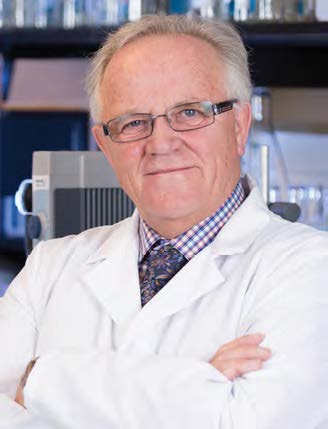Spring 2022 (Volume 32, Number 1)
Reflections on Retirement
By Marvin J. Fritzler, PhD, MD
Download PDF

I recently retired from the University
of Calgary after 50 years in academia.
Retirement has been a time for
reflection and “post-mortem” evaluations.
In considering the many people
that impacted my formative years and
introduced me to academic rheumatology,
I remember with gratitude the
wisdom and encouragement of Ian
Watson, Bob Church, Doug Kinsella,
Phil Gofton, Manfred Harth, Henri
Menard, Dave Bell, Earl Decoteau and
Dave Hawkins (a legend in his own
time). Since I didn’t set goals or have a
mission statement for my academic career,
I have no checklist that reassures
me that I accomplished anything. I recently
started to clean out my university
office, a physical and mental purging of momentous
proportions. I amassed hundreds of books and thousands
of research files and notebooks that included projects that
I thought would be important some day: 99.9% have been
thrown away! I reflected on this in a recent article I co-authored:
Autoantibody Discovery, Assay Development and
Adoption: Death Valley, the Sea of Survival and Beyond.1
Sure, there are research files that are still interesting to
me, but I’ll bet not to you. I doubt that anyone will ask
me “what happened to your research on "LINES" (long-interspersed
nuclear elements), anti-sense ERCC1, or (my
favorite) kappaphredon (aka ‘dimethylchickenwire’)?”
Because it provides a tincture of healing, there are
two things I didn’t throw away. First is a collection of letters,
cards and emails from former patients or their family
members who thanked me for the clinical care I provided.
The second is a plaque that my children gave me quoting
Albert Einstein: “If we knew what it is we were doing, it
wouldn’t be called research.” The pandemic has allowed
ample time for reflection on scientific research. An important
“lesson” came from a colleague while several of us were
embroiled in an email debate about certain published
COVID-19 data. He said, “It is important to remember that
science is provisional”; or, as I often said, “the data never
speak for themselves, they have to be interpreted.” Hence,
the oft used aphorism today “we follow the science” bears
witness that many people do not understand science.
Over my career I had the fortune to serve on numerous
agencies, boards, consultancies, and committees. Some
continue, some do not. I think the most
valuable committees were those that
could disband having accomplished
what they set out to do. Many others
persist in peeling the proverbial onion.
What have I learned, and what are
my take-home messages? First a paradox,
progress is only seen by looking in
the rear-view mirror. The bugs on the
windshield only serve as a distraction
from the scenery and the dashboard is
only a reference for that specific moment.
Second, what is intuitive (particularly
in academia) rarely happens.
Third, the rumours (today on social
and even mass media) are rarely true
or accurate.
What are my concerns? 1) our
young academics are overburdened with legalistic, risk-averse
institutions that are swamping them with minutiae;
2) peer review is on the cusp of failure (it has become “political
review”) and if it continues its current trend, it will
take science to irrelevance (try following it then); 3) what
will post-pandemic health care or academic research look
like?
I leave these concerns in the hands of a very capable
new generation who I am confident will effect needed
course corrections. They are much brighter and more dedicated
to equitable, diverse, and inclusive patient care
and research than I was when I started. Through all of this,
the Canadian Rheumatology Association has been, and I
expect will continue to be, a vibrant and reassuring anchor
of leadership and collegiality. I consider it an honour to be
one of you.
Marvin J. Fritzler, PhD, MD
Adjunct Professor,
Departments of Medicine, Biochemistry & Molecular Biology
Cumming School of Medicine
University of Calgary
Calgary, Alberta
References:
1. Fritzler MJ, Choi MY, Satoh M, et al. Autoantibody Discovery, Assay Development and Adoption:
Death Valley, the Sea of Survival and Beyond. Front Immunol. 2021;12. doi.org/10.3389/fimmu.2021.679613.
|
